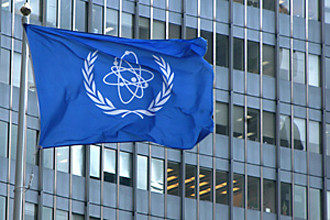Senior international nuclear safety experts today concluded a 12-day International Atomic Energy Agency (IAEA) mission to review India's regulatory framework for safety of nuclear power plants (NPPs).
In its preliminary findings, the Integrated Regulatory Review Service (IRRS) team noted that the Republic of India has forecast that nuclear power generation in India will increase significantly over the next decade. This poses challenges to the country, as it must maintain sufficient regulatory oversight of both operating nuclear power plants and those under construction.
"The IRRS team concluded that there is a strong commitment to safety in India," said team leader Ramzi Jammal, Executive Vice-President and Chief Regulatory Operations Officer at the Canadian Nuclear Safety Commission. "India's Atomic Energy Regulatory Board is an experienced, knowledgeable and dedicated regulatory body for the protection of the public and the environment. It continues to enhance its regulatory programme to face the current and future challenges in regulating nuclear safety, such as reinforcing the safety of existing nuclear facilities, monitoring ageing and decommissioning, as well as providing oversight of the construction, commissioning and operation of new nuclear power plants."
The Indian Government had invited the review, which included interviews and discussions with regulatory staff and site visits to observe inspections. The mission team compared the Indian regulatory framework for nuclear safety with IAEA safety standards.
S.S. Bajaj, Chairman of the India Atomic Energy Regulatory Board, who received the IRRS draft report at the conclusion of the mission, said:
"The acknowledgement of the effectiveness of India's safety regulation in the outcome of this IRRS mission has renewed AERB's resolve and commitment for ensuring a high level of safety in the facilities and activities. AERB is committed to pursuing the improvements suggested by the mission towards further strengthening the regulatory framework."
The IRRS team identified good practices including:
- India has a comprehensive and well-established national educational and training system that supports competence-building for its nuclear programme;
- The AERB takes full benefit from operational experience with the aim of continuously enhancing its regulatory framework and processes;
- The AERB's research and development infrastructure provides strong regulatory review and assessment activities, and
- The scope and depth of the AERB recruitment and training programme is effective in maintaining a knowledgable technical staff.
The mission provided recommendations and suggestions for improvement, including the following:
- The Government should promulgate a national policy and strategy for safety, and a radioactive waste management strategy as a statement of the Government’s intent;
- The Government should embed the AERB's regulatory independence in law, separated from other entities having responsibilities or interests that could unduly influence its decision making;
- The AERB should review the implementation of its policy and existing arrangements to ensure it maintains independence in the performance of its regulatory functions;
- The AERB should consider increasing the frequency of routine on-site inspections at NPPs to allow for additional independent verification and more effective regulatory oversight, and
- The AERB should develop and implement its own internal emergency arrangements including detailed procedures to fulfil its emergency response role.
The final mission report will be provided to the Indian Government in about three months.
Quick Facts
India has 21 operating nuclear power reactors and seven under construction. The review of other uses of nuclear materials and radioactive sources were not within the scope of this IRRS Mission.
About IRRS Missions
IRRS missions are designed to strengthen the effectiveness of the national nuclear regulatory infrastructure, while recognizing the ultimate responsibility of each State to ensure nuclear safety. This is done through consideration of regulatory, technical and policy issues, with comparisons against IAEA Safety Standards, and, where appropriate, good practices elsewhere.
More information about IRRS missions is available on the IAEA Website.


